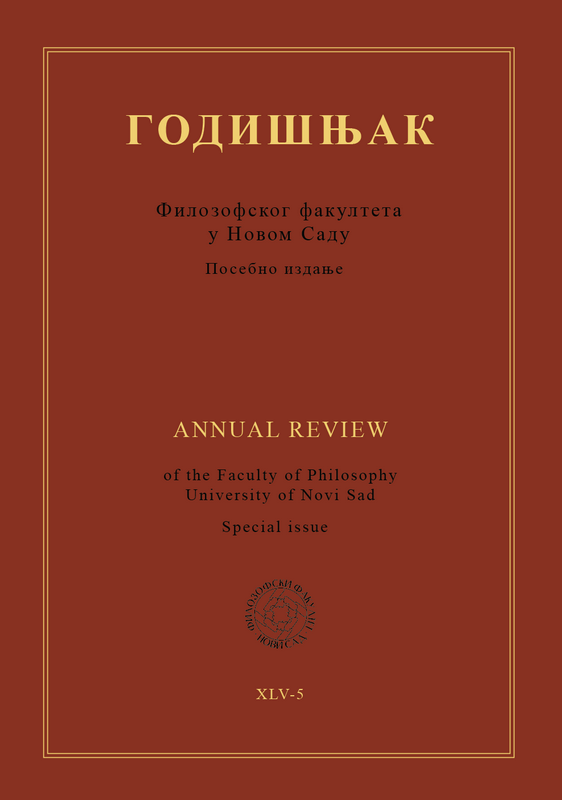KUREISHI’S LAUNDRETTES AND SUBURBS: PRIVATE AND PROFESSIONAL SPACES OF LONDON IN THATCHERISM
Main Article Content
Abstract
The literary production of politically engaged British authors of colonial descent play a decisive cultural role in subverting the neoliberal hegemony, marrying literary aesthetics to wider social concerns. This role is often enacted through their depiction of the hierarchical postcolonial cityscape, such as the segregation of spaces into the ghettoized South London and affluent neighbourhoods of North London, and the divisions that run through the Edwardian villas of the moneyed classes and the council estates occupied by the working classes, often the immigrants. Such portrayals of space challenge the British neoliberal propaganda of contemporary Britain as a post-race and post-class society. In lieu of this, London’s spaces are interpreted in this paper as places radically altered by the subjects that occupy them, bending them to their needs, just as the spaces in return shape their inhabitants. It is at the margins of a society where the social power dynamics are refracted and most acutely felt, which makes the work of Hanif Kureishi, an acclaimed novelist, playwright and film director, an ideal guide through the British neoliberal landscape, from neoliberal origins in Thatcherism in the 1980s, down to the present day, with the acting right-wing elite’s proclamation of the failure of multiculturalism. The race- and class-inflected topography of London during the Thatcher years is the topic of both works considered in this paper – Kureishi’s 1990 novel The Buddha of Suburbia and the critically acclaimed 1985 motion picture My Beautiful Laundrette for which Kureishi wrote the script. These texts counter the Thatcherite vision of 1980s Britain as a unified, homogenous nation by depicting deep social rifts among social subjects and diversity of identity, both of which were aided by the neoliberal tenet of individualism and the resulting crumbling solidarity among the dispossesed classes. The objective of this paper therefore is to show that Kureishi’s ambivalent attitude toward neoliberalism stems from the author’s intention to expose the neoliberal ideology as capable of appropriating intimate spaces and of granting its subjects libidinal pleasure exactly at those places where business is conducted and where the profit is made. In this way, late capitalism blurs the boundaries between the private and the professional spheres of human existence, and consequently neutralizes social dissent and the subjects’ awareness of ongoing exploitation. To put it differently, Thatcher’s neoliberal variety characterized by the cultivation of entrepreneurship, individualism and fluid identities, both in the novel and the film, manifests the ability of neoliberalism to forge a strong nexus between the business and the private relations among the characters.
Downloads
Article Details
References
Debord, G. (1955). Introduction to a Critique of Urban Geography. In: Les Lèvres Nues. Trans. from French by Ken Knabb. URL:http://www.cddc.vt.edu/sionline/presitu/geography.html
Eagleton, T. (2007). Ideology: An Introduction. London: Verso.
Fuko, M. (2005). Druga mesta. In: Milenković, P. and Marinković, D. (eds.) Hrestomatija: 1926-1984-2004. (2005). Novi Sad: Vojvođanska sociološka asocijacija. 28-36.
Harvey, D. (2005). A Brief History of Neoliberalism. Oxford: OUP.
Kamiel, D. (2015). “I Believe My Eyes”: The Transformative Cinema of Hanif Kureishi. In: Fischer, S. A. (ed.). (2015). Hanif Kureishi: Contemporary Critical Perspectives. London: Bloomsbury Academic. 21-33.
Kureishi, H. (1984). My Beautiful Laundrette. Director: Stephen Frears (1984). London: Faber.
---------------------. (1990). The Buddha of Suburbia. London: Faber.
Litter, J. (2013). Meritocracy As Plutocracy: The Marketising Of ‘Equality’ Under Neoliberalism. In: New Formations 80/8, 52-72.
Lyotard, J.F. (1984). The Postmodern Condition: A Report on Knowledge. Trans. From French by Geoffrey Bennington and Brian Massumi, Minneapolis: University of Minesota Press.
Martin, R. (2015). London and Professional Society in H. G. Wells's Tono-Bungay and Hanif Kureishi's The Buddha of Suburbia. In: Studies in the Humanities 42.1, 82-100. Pro Quest.
Massey, D. (2007). World City. Cambridge, UK: Polity Street.
Moore-Gilbert, B. (2001). Hanif Kureishi. Manchester: Manchester University Press.
Ože, M. (2005). Nemesta: Uvod u antropologiju nadmodernosti. Prev. sa francuskog Ana A. Jovanović. Beograd: Biblioteka XX vek.
Procter, J. (2003). Dwelling Places: Postwar Black British Writing. Manchester: Manchester UP.
Salmon, P. (1993). Revising the Traditions: Hanif Kureishi and Contemporary British Cinema. In: Canadian Journal of Film Studies (ARCHIVE) 2.3, 107- 114.
Trimm, R. (2015) ‘The Suburbs That Did It’: Hanif Kureishi's The Buddha of Suburbia and Metropolitan Multicultural Fiction. In: Fischer, S. A. (ed.) (2015). Hanif Kureishi: Contemporary Critical Perspectives. London: Bloomsbury Academic.




